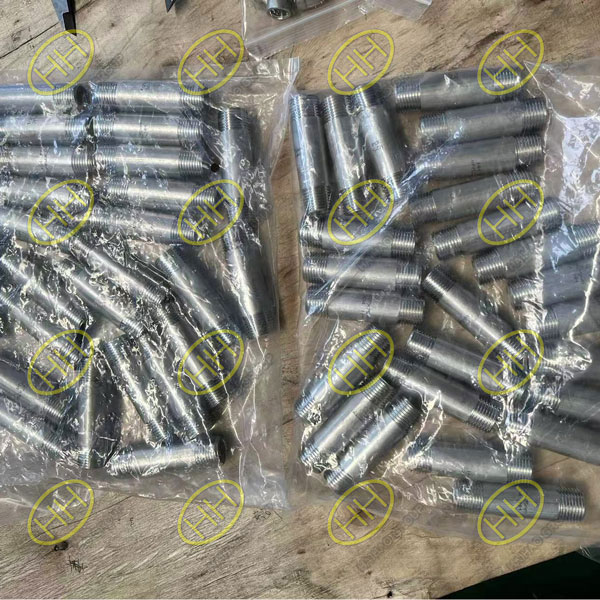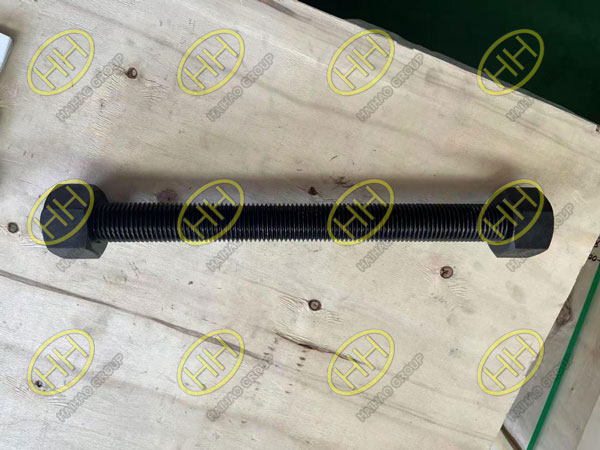A320-L7 vs A193 B7: What’s the difference and when to use each?
In industrial bolting applications, ASTM A320 Grade L7 and ASTM A193 Grade B7 are two of the most commonly specified materials for stud bolts. While they share similarities in mechanical strength and alloy composition, these two grades are designed for different service environments. Understanding their differences is critical for engineers, procurement teams, and maintenance professionals working in oil & gas, power generation, petrochemical, and cryogenic systems.
This article explores the key differences between A320 L7 vs A193 B7, helping you select the right material for your bolted joint applications.

ASTM A193 Grade B7 Stud Bolts ready for shipment
1.Overview of ASTM A193 B7 and ASTM A320 L7
| Property | ASTM A193 Grade B7 | ASTM A320 Grade L7 |
| Material Type | Chromium-Molybdenum Alloy Steel | Chromium-Molybdenum Alloy Steel |
| Heat Treatment | Quenched & Tempered | Quenched & Tempered |
| Service | High-temperature/General service | Low-temperature/Cryogenic service |
| Typical Use | Refinery, petrochemical piping | LNG, cryogenic vessels, cold storage |
| Standards | ASTM A193 | ASTM A320 |
| Impact Testing | Not required unless specified | Mandatory impact testing at -101°C |
2.Temperature Service Range
The most significant difference between A193 B7 and A320 L7 lies in the temperature service they are designed for:
A193 Grade B7: Intended for high-temperature and general-purpose bolting in pressure vessels, valves, and flanges. Suitable for environments above -29°C (–20°F).
A320 Grade L7: Specifically engineered for low-temperature applications, with mandatory Charpy impact testing at -101°C (–150°F). It is widely used in cryogenic service, such as LNG facilities and low-temp storage tanks.
3.Mechanical Properties Comparison
Both grades offer similar tensile strength, but A320 L7 is impact-tested to ensure ductility and toughness under sub-zero conditions.
| Property | A193 B7 | A320 L7 |
| Tensile Strength (MPa) | ≥ 860 | ≥ 860 |
| Yield Strength (MPa) | ≥ 720 | ≥ 720 |
| Hardness (HB) | 197 – 235 | 197 – 235 |
| Impact Requirement | Optional | Required (-101°C test) |
4.Application Examples
When to use A193 B7:
- Power plants piping systems
- High-pressure steam lines
- Heat exchangers
- Chemical reactors
When to use A320 L7:
- Cryogenic vessels and equipment
- LNG processing plants
- Cold storage flanges
- Low-temperature pressure vessels

ASTM A320 Grade L7 Stud Bolt Produced By Haihao Group
5.Certification & Inspection Requirements
A320 L7 requires stricter quality control and documentation due to its use in critical cryogenic applications:
A320 L7 bolts must come with impact test reports, usually to EN 10204 3.1 or 3.2 standards.
Common supplementary requirements include NACE MR0175, MESC SPE 81/002, or ISO 10474-3.1B for oil & gas services.
6.Can A193 B7 and A320 L7 Be Interchanged?
Not recommended.
Even though their chemistry and strength may appear similar, the absence of impact testing in A193 B7 makes it unsafe for low-temperature environments. Substituting B7 for L7 in cryogenic service can lead to brittle fracture failures.
However, in non-cryogenic environments, L7 may sometimes be used in place of B7 if superior toughness is required, subject to engineering approval.
7.Conclusion: Choose Based on Service Temperature
When selecting between A320 L7 vs A193 B7 stud bolts, the decision primarily depends on the minimum design temperature of the application:
For general and high-temp service: Choose A193 B7
For cryogenic and low-temp service: Choose A320 L7
Understanding these differences ensures safe, compliant, and cost-effective bolted joint design.
Looking for certified A320 L7 or A193 B7 fasteners?
Haihao Group supplies a full range of stud bolts, nuts, and flanges complying with ASTM, ASME, and MESC standards, with complete 3.1 certifications. Contact us today for customized low- and high-temperature bolting solutions.

